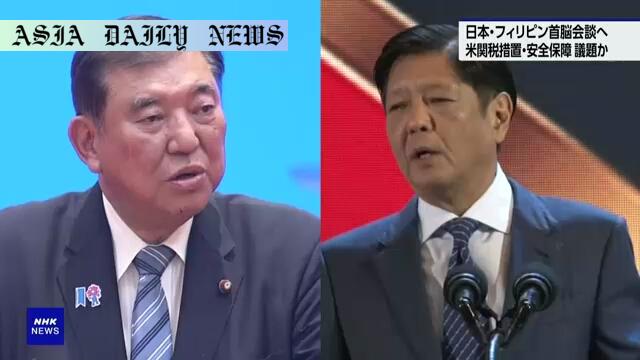Security Cooperation – Japan’s PM Ishiba Shigeru meets Philippine President Marcos to bolster ties, address regional security threats.
Ishiba Shigeru arrives in the Philippines for talks on regional security and defense collaboration.
Focus on boosting security ties amid China’s assertiveness in the South China Sea.
Potential ACSA agreement to enhance interaction between Japan Self-Defense Forces and Philippine military.
Discussions on shared opposition to status quo changes through coercion.
Dialogue on US tariffs’ effects on the global and regional economy.

Strengthening Ties Between Japan and the Philippines
Japan’s Prime Minister Ishiba Shigeru has embarked on a significant Southeast Asia tour, highlighting Japan’s intent to bolster alliances and address pressing regional challenges. As part of his tour, Ishiba arrived in the Philippines after visiting Vietnam, intending to strengthen bilateral relations with the host country and focus on security concerns affecting the region. Upon landing, the Japanese premier’s itinerary underscored his commitment to creating meaningful connections by first meeting individuals of Japanese-Philippine descent, who represent a historical link between the two nations.
The Focus on Regional Security
The cornerstone of Ishiba’s visit lies in discussions with Philippine President Ferdinand Marcos Jr. on regional stability. As the East and South China Seas become hubs of rising geopolitical tension, both leaders are likely to reaffirm their opposition to any unilateral actions aimed at altering the status quo by force or coercion. The meetings are aligned with fostering mutual security arrangements and advancing dialogues toward a proposed Acquisition and Cross-Servicing Agreement (ACSA). If finalized, this agreement is set to facilitate the exchange of resources and services between Japan’s Self-Defense Forces and the Philippine military, further cementing their collaboration.
Addressing Economic Concerns Amid Global Shifts
Beyond security, the leaders are also expected to explore economic topics, including the implications of the United States’ tariff strategies on the global and regional economies. As staunch advocates of free trade, both Japan and the Philippines aim to ensure resilient economies underpinned by cooperative trade practices. These discussions will not only reflect shared economic priorities but also further Japan’s overarching Southeast Asia strategy to promote stability, growth, and trust in the region.
Historical Ties and Modern Diplomatic Progress
In parallel, Prime Minister Ishiba’s engagement with descendants of Japanese-Philippine ancestry underscores a commitment to reconciling past challenges and forging inclusive narratives moving forward. These individuals, often marginalized due to wartime disruptions, represent an important facet of Japan-Philippine history. This gesture by Ishiba demonstrates Japan’s intent to lay a compassionate and forward-looking foundation for diplomatic relations.
The Bigger Picture in Southeast Asian Diplomacy
Ishiba’s visit to the Philippines reflects Japan’s broader strategy to ensure partnerships with Southeast Asian nations, particularly in the face of China’s growing maritime assertiveness. As he tours the region, Ishiba aims to unite like-minded nations towards a vision of cooperation, resilience, and an unyielding commitment to peace. These diplomatic efforts serve not only to address immediate concerns but also to pave the way for long-term collaboration and security in the Asia-Pacific.



Commentary
A Strategic Move in the Face of Regional Challenges
Prime Minister Ishiba Shigeru’s visit to the Philippines highlights Japan’s evolving role in regional and global politics. By prioritizing issues such as maritime security and defense collaboration, Ishiba is emphasizing Japan’s commitment to ensuring stability in an increasingly fragile geopolitical environment. These moves underscore not only the growing ties between Japan and its Southeast Asian neighbors but also Tokyo’s responsibility as a key player in the Asia-Pacific region.
The Importance of Multilateral Alignment
As regional tensions continue to escalate due to China’s assertive stance in the East and South China Seas, the partnership between Japan and the Philippines becomes even more critical. A bilateral focus, paired with multilateral alignment, can significantly contribute to preserving a rules-based international order. The proposed ACSA agreement symbolizes a step forward in aligning military capacities for mutual benefits.
Economic Collaboration: A Steady Complement to Security
Beyond security, the dialogue surrounding economic policies is equally noteworthy. With the potential repercussions of evolving US tariff strategies on global commerce, nations like Japan and the Philippines must work in unison to advocate for free trade principles. It is through such collaborations that the region’s economies can withstand global disruptions while fostering shared prosperity.
A Broader Perspective on Diplomacy
From a diplomatic standpoint, Ishiba’s visit is a dynamic balance of addressing historical sensitivities, such as meeting Japanese-Philippine descendants, and advancing modern cooperative frameworks. It is a reminder that diplomacy is not merely about addressing present challenges but also about reconciling past issues to build a more cooperative and inclusive future.